
Taking on a new pet is a big commitment, no matter how big or small the animal you're thinking of bringing home.
In order to make sure both you and your pet can live together happily, it's important that you choose the right pet for your lifestyle. Read our small animal facts to find a new best friend for your family! And if you want more detailed information, book an appointment with our team who will be able to advise you further.
Chinchilla
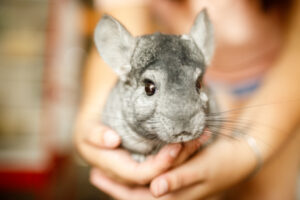
Chinchillas can be really great to have around your home. They’re quite sensitive animals, making them more suitable for older children or adults.
Size
A fully grown adult is about 30cm long.
Lifespan
Chinchillas can live for around 15 to 20 years.
Food
A specially-made chinchilla food should form the base of their diet, as well as plenty of hay for them to chew on. It's also essential that chinchillas always have access to fresh water, so you'll need to make sure their water bottle is constantly topped up.
As an occasional treat, chinchillas will enjoy small quantities of fresh vegetables and other greens. However, they can be quite sensitive to changes to their diet, so it's important to keep their foods the same, with just a small amount of variety that they can also become familiar with.
Environment
Chinchillas can be a little shy by nature, although once they get to know you they can be fairly sociable animals. Keeping chinchillas in pairs will provide all their companionship needs, though make sure they're the same sex.
They need plenty of space in their cage, as they'll like to explore the different areas in their home to keep themselves entertained, so the more interesting the cage the better. Chinchillas are also good at jumping. They have strong back legs so having different levels in their cage would be ideal.
Chinchillas like a soft bedding to nestle down in.
Degu
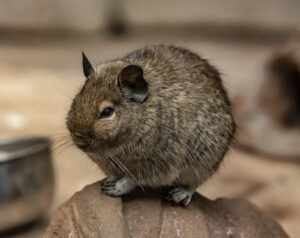
Degus are very intelligent and highly sociable animals that love to play and explore. They have a friendly nature and are outgoing little rodents. Their lively nature makes them more suitable as pets for older children or adults.
Lifespan
Degus can live 6 or 8 years.
Environment
In their natural habitat, they live in groups so for this reason, you should always keep them in a same-sex pair.
Degus are complex and curious little creatures. They require plenty of your time, attention and care. You must be prepared to commit to them and their welfare.
Play for degus is an enriching experience and stimulates them mentally. It’s fun for you to set them little foraging challenges. They’ll also love degu-friendly toys and some wooden chews to gnaw on. This will also keep their front teeth in good condition – an essential part of looking after rodents.
Degus enjoy running around, climbing and exploring, so it’s important that you have plenty of space in your home for them to exercise. House them in a cage with plenty of levels and areas for them to dig to keep them stimulated.
Degus are affectionate and will sleep close, snuggled together. Build a comfy, cosy bed space of tissue or pet-safe paper in their cage. You can try and nurture their natural instincts by poking this through the bars and watch them build their own little den. Keep their space refreshed with hay and fresh water, and clean out twice a week to keep it a clean and cosy habitat.
Degus are cute. And they know it! They can enjoy being stroked – some even raise their little paws for a belly rub! They might even start returning the affection and grooming you!
Gerbil
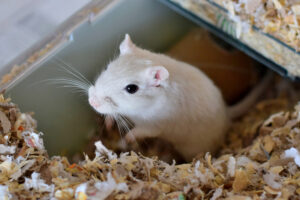
Much like other rodents, gerbils can provide plenty of entertainment for the family.
Size
Gerbils typically grow to between 15-30cm.
Lifespan
Gerbils live for an average of 3 to 4 years.
Food
Gerbils like to eat a specially-designed gerbil museli. As a treat, they also like small amounts of fresh apple or carrot. Like most other rodents, gerbils also like to gnaw, so make sure they have things to chew as this will help to keep their teeth nice and healthy.
Environment
Gerbils tend to get lonely very easily, so it's better to keep them in pairs of the same sex. They also like to be kept entertained, so providing toys or hiding food for them to find around their cage will offer a good source of entertainment.
Whilst they do like a typical cage area, gerbils also like to have a plastic or glass tank space that contains lots of material, such as wood chip, that they can dig into tunnels - endless fun for gerbils!
Provide them with soft bedding material too so they can make themselves a cosy nest-like bed.
Gerbils will love attention once they’re used to you, however, they can be fidgety when being handled, so it's important to take extra care; and its best to handle them over a table or other surface, just in case they manage to wriggle free.
Gerbils have long tails that they use to help them balance - a gerbil should never be picked up by its tail.
Guinea Pig
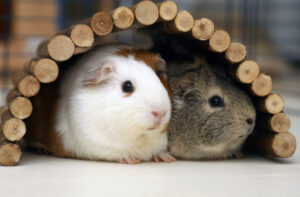
Guinea pigs can be hugely rewarding pets for both adults and children due to their small size and gentle temperaments. Inquisitive and intelligent, guinea pigs can become friendly and affectionate pets if you handle them gently from a young age.
Lifespan
Guinea pigs usually live for 5 to 6 years.
Environment
Guinea pigs can be great pets for children, although they may not appreciate being around noise as they have quite sensitive hearing. They are not solitary pets and best suited to living in same-sex pairs.
Due to their sensitive hearing, your guinea pig might not like living with pets that are noisy or overly excitable. If you do have other pets, you should never leave them unattended with your guinea pig.
Guinea pigs shouldn’t live with rabbits because they both have different diets and communicate in different ways. Rabbits have been known to bully or injure guinea pigs as well as pass on diseases to them, so keeping them apart is going to be best for your guinea pig.
Hamster
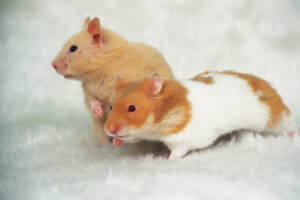
Pairs of dwarf hamsters can make great family pets - they're relatively easy to care for and can be very rewarding.
Types of hamsters
Dwarf hamsters are very small, move quickly and are sensitive to rough handling, which can make them unsuitable for younger kids who may get too excited. They thrive with company and are best housed in same-sex pairs.
Syrian hamsters are solitary animals, and must live alone. They are not easy to handle and so if hamsters are your choice of pet, we recommend a pair of Dwarfs rather than a Syrian breed.
Lifespan
Depending on the type of hamster, they usually live for around 2 years.
Environment
Hamsters are relatively low maintenance pets to look after, although caring for them still takes time. They need daily feeding, a weekly clean and regular health check, as well as plenty of handling to help them get used to you.
Hamsters are nocturnal, so you can expect your pet to sleep for most of the day, before waking up in the evening and being active at night. So it’s best to care for your hamster in the evening when they will be naturally awake.
They are active little characters, so they will need a wheel to run in as well as tubes to run through, room to explore and hiding places.
Your hamster won’t like being disturbed when they’re sleeping, so it’s best to keep them somewhere quiet and away from any other pets you may have. And because you won’t want to be disturbed when you’re sleeping either, you might not want to keep them in your bedroom as some can be quite noisy at night.
Mouse
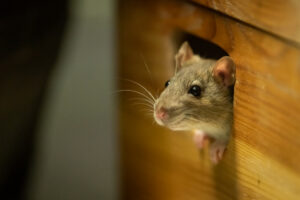
Friendly and fun-sized, mice make perfect pets.
Size
Pet mice usually grow to around 15 to 18cm, from their nose to the tip of their tail.
Lifespan
Generally, mice live to be around 2 to 3 years old.
Environment
Buy a mouse cage that's as big as possible – and ideally split into different levels or sections to give them lots to explore.
Good ventilation is vital whatever cage you choose - especially in warmer months.
The bedding at the bottom of the cage should be made up of a soft and odour-controlling material such as wood shavings or special paper bedding.
Provide toys they can gnaw on, a plastic exercise wheel, cardboard tube or small hideaway. Mice naturally build nests, so make sure you provide appropriate nesting material as well as their bedding, to allow some burrowing and building.
Mice are very active and move very quickly, making them tricky to handle. Mice are also delicate, so need to be handled gently and with care. This means children who come into contact with them will need to be old enough to be taught the right way to hold them, and be supervised when touching them.
Mice love company, so it's a good idea to have two together. Generally, female mice make the best pets - especially for first-time owners - because they are happy to be kept together. Male mice may squabble, which could result in injury, while a male and female will breed.
Rabbit
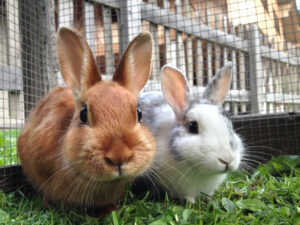
Rabbits can make great family pets. They love attention and playing games. As you spend time with them, you’ll enjoy getting to know their individual personalities.
Size
Rabbits can vary hugely in size, depending on the breed.
Netherland Dwarfs are the smallest variety, weighing around 1.5kg whilst Flemish Giants are the largest, weighing over 7kg!
Lifespan
Rabbits can live to around 12 years and will be a lovable part of the family over that time if they receive the right care and attention.
Environment
In the wild rabbits live in fields, hedgerows, woodlands and farmland. So if you plan to house them outdoors, you’ll need to make sure they have a large protected area to explore as well as a good sized hutch in which to shelter and rest. Just be sure that they are warm enough during winter.
Rabbits also make excellent indoor pets. They are quiet, clean and will use a litter tray, with some simple training. They will need plenty of space and objects to explore; any rooms that rabbits live in must be bunny-proofed, free of any electrical wires and furniture protected, unless you want it chewed! Even inside, pet rabbits will want a place to hide and rest, so a good sized indoor hutch is recommended.
Rabbits are happiest when kept in pairs. A good pairing is a neutered male and a neutered female. New partners should be carefully introduced to each other after seeking expert advice and with due care and attention.
Rabbits prefer the company of other rabbits and won’t like encountering other animals. They shouldn’t be housed with guinea pigs, they're known to bully or injure them; and they eat slightly different diets too.
Looking after your rabbits will take up quite a bit of time as they will need cleaning out regularly, and feeding and checking every day.
Rat
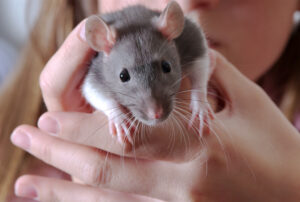
Rats are very clean animals, and they can make excellent household pets. Rats are very sociable animals, and if they’re handled properly from a young age then they can really enjoy interacting with humans.
Lifespan
Rats usually live for around 2 years.
Environment
Rats are fairly low maintenance pets but they still require regular feeding, cleaning and general care. You’ll need to keep an eye on things like their weight to make sure they’re not overeating, and the length of their teeth, as the ones at the front never stop growing.
As with any small animal, the more space you can give your pet the better. You should get the biggest cage you can so that your rat has lots of room to exercise and explore. Rats love to climb and hide, so you need to fill their cage with things like shelters and climbing toys. Although they aren’t nocturnal, rats are most active at night, dawn and dusk, so it’s best to keep them somewhere quiet so you don’t disturb them, and they don’t disturb you!
Rats particularly enjoy the company of other rats. Unless you have a very good reason not to, you should get a same-sex pair or group of rats so they have the companionship that they need. Although rats can easily be introduced to each other at a later date, it’s best to get your rats at the same time if they’ve been kept together as they’ll already have a bond.
